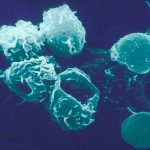Link to Pubmed [PMID] – 15286781
Nat. Med. 2004 Aug;10(8):801-5
The immune system evolved to protect the host against the attack of foreign, potentially pathogenic, microorganisms. It does so by recognizing antigens expressed by those microorganisms and mounting an immune response against all cells expressing them, with the ultimate aim of their elimination. Various mechanisms have been reported to control and regulate the immune system to prevent or minimize reactivity to self-antigens or an overexuberant response to a pathogen, both of which can result in damage to the host. Deletion of autoreactive cells during T- and B-cell development allows the immune system to be tolerant of most self-antigens. Peripheral tolerance to self was suggested several years ago to result from the induction of anergy in peripheral self-reactive lymphocytes. More recently, however, it has become clear that avoidance of damage to the host is also achieved by active suppression mediated by regulatory T (T(reg)) cell populations. We discuss here the varied mechanisms used by T(reg) cells to suppress the immune system.

